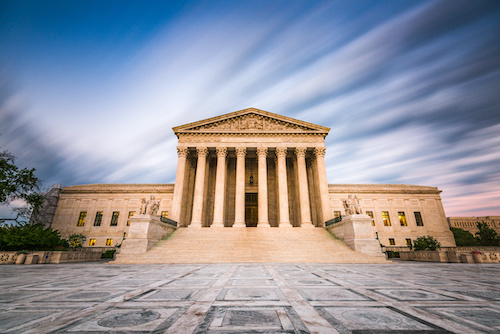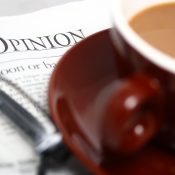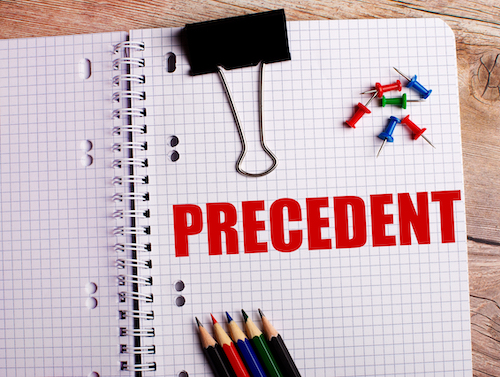“The United States cautions in its amicus brief that the Ninth Circuit’s approach ‘could weaken copyright protection and make it more difficult for copyright holders to proceed with infringement suits.'”
 The U.S. Supreme Court today granted a motion made by the Acting U.S. Solicitor General to participate in oral argument as an amicus in the case of Unicolors v. H&M. The case asks the Court to decide whether the Ninth Circuit properly construed the language of 17 U.S.C. § 411 relating to whether courts must have evidence of intent to defraud before referring copyright registration validity questions to the Copyright Office. Oral argument is set for November 7.
The U.S. Supreme Court today granted a motion made by the Acting U.S. Solicitor General to participate in oral argument as an amicus in the case of Unicolors v. H&M. The case asks the Court to decide whether the Ninth Circuit properly construed the language of 17 U.S.C. § 411 relating to whether courts must have evidence of intent to defraud before referring copyright registration validity questions to the Copyright Office. Oral argument is set for November 7.
Interpreting Section 411 (b)
The High Court granted Unicolors’ petition for writ of certiorari in June of this year, limiting its review to question one of the two questions presented, which asks:
Did the Ninth Circuit err in breaking with its own prior precedent and the findings of other circuits and the Copyright Office in holding that 17 U.S.C. § 411 requires referral to the Copyright Office where there is no indicia of fraud or material error as to the work at issue in the subject copyright registration?
The relevant language of 17 U.S.C. § 411, enacted as part of the 2008 Prioritizing Resources and Organization for Intellectual Property Act (PRO IP Act), reads:
17 U.S. Code § 411 – Registration and civil infringement actions
(b)
(1) A certificate of registration satisfies the requirements of this section and section 412, regardless of whether the certificate contains any inaccurate information, unless—
(A) the inaccurate information was included on the application for copyright registration with knowledge that it was inaccurate; and
(B) the inaccuracy of the information, if known, would have caused the Register of Copyrights to refuse registration.
Ninth Circuit Ruling
In May of 2020, the U.S. Court of Appeals for the Ninth Circuit found that multinational clothing company H&M had raised an issue regarding the validity of Unicolors’ copyright registration covering 31 separate fabric designs in a single registration. While the California court had dismissed H&M’s post-trial renewed motion for judgment as a matter of law (JMOL), the Ninth Circuit found that the denial of JMOL was flawed and that the court should have asked the Register of Copyrights to advise whether the registration would have been denied, since several designs covered in the single registration were confined to designs not made publicly available, and weren’t “included in a single unit of publication” as required for copyright registration.
The Ninth Circuit cited its 2019 decision in Gold Value International Textile, Inc. v. Sanctuary Clothing, LLC as clarifying that there is no intent-to-defraud requirement for copyright invalidation; all that mattered under the plain language of Section 411(b)(1) was that the registration contained “inaccurate information [that] was included… with knowledge that it was inaccurate,” said the court. Unicolors points out that this conflicts with the U.S. Court of Appeals for the Eleventh Circuit’s ruling in Roberts v. Gordy (2017), which held that invalidation of a copyright registration for inaccurate information under Section 411 required a showing of “intentional or purposeful concealment of relevant information.”
Support on Both Sides
In its August 3 brief, Unicolors argues that a finding for H&M will “depart from a century of precedent and start penalizing poets and artists for innocent mistakes in copyright registrations.” H&M’s brief for the respondent accuses Unicolors of being “a serial copyright plaintiff with a long history of gaming the registration process,” and points to the plain language of the statute as requiring only “knowledge,” and not fraudulent intent.
Various amici have also weighed in, with support for both parties. Support for Unicolors includes The Copyright Alliance; The American Society of Media Photographers, Inc. and California Society of Entertainment Lawyers, joined by Twelve Creator Rights Organizations; and five Intellectual Property Law Professors, including Susan Scafidi of Fordham University School of Law’s Fashion Law Institute. The American Intellectual Property Law Association (AIPLA) and the Intellectual Property Law Association of Chicago (IPLAC) do not support a particular party, but argue for reversal of the Ninth Circuit’s ruling. The United States Government also filed an amicus brief supporting Unicolors, and now will take part in the oral argument.
Supporting H&M are The National Retail Federation; Law Professor Victoria Burke; the California Fashion Association; the Center for Democracy & Technology and the Electronic Frontier Foundation; and a group of 12 Professors of Copyright Law, including Mark Lemley of Stanford Law School.
The United States cautions in its amicus brief that the Ninth Circuit’s approach “could weaken copyright protection and make it more difficult for copyright holders to proceed with infringement suits.” The government also argues that the PRO IP Act, in Section 411(b), actually codified “scienter and materiality requirements for invalidation of a copyright registration based on inaccurate information in the application” and that the Ninth Circuit’s reading of the statute “is inconsistent with the history and purpose” of that legislation.
The Supreme Court in today’s Order List also invited the Solicitor General’s views in Epic Systems v. Tata Consultancy Services, a case that asks the Court to weigh in on whether the Seventh Circuit properly ruled that a $280 million punitive damages award for Epic was excessive.
Image rights acquired by AdobeStock

![[IPWatchdog Logo]](https://ipwatchdog.com/wp-content/themes/IPWatchdog%20-%202023/assets/images/temp/logo-small@2x.png)

![[Advertisement]](https://ipwatchdog.com/wp-content/uploads/2024/05/LexisNexis-May-16-2024-sidebar-700x500-1.jpg)
![[Advertisement]](https://ipwatchdog.com/wp-content/uploads/2024/04/Patent-Litigation-Masters-2024-sidebar-last-chance-700x500-1.jpg)
![[Advertisement]](https://ipwatchdog.com/wp-content/uploads/2024/05/Patent-Portfolio-Management-2024-sidebar-super-early-bird-with-button-700x500-1.jpg)
![[Advertisement]](https://ipwatchdog.com/wp-content/uploads/2024/05/Artificial-Intelligence-2024-Getting-AI-Patents-Allowed-sidebar-700x500-1.jpeg)

![[Advertisement]](https://ipwatchdog.com/wp-content/uploads/2021/12/WEBINAR-336-x-280-px.png)
![[Advertisement]](https://ipwatchdog.com/wp-content/uploads/2021/12/2021-Patent-Practice-on-Demand-recorded-Feb-2021-336-x-280.jpg)
![[Advertisement]](https://ipwatchdog.com/wp-content/uploads/2021/12/Ad-4-The-Invent-Patent-System™.png)







Join the Discussion
No comments yet.